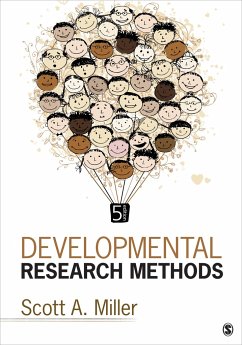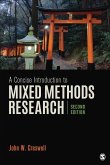Scott A Miller
Developmental Research Methods
Scott A Miller
Developmental Research Methods
- Broschiertes Buch
- Merkliste
- Auf die Merkliste
- Bewerten Bewerten
- Teilen
- Produkt teilen
- Produkterinnerung
- Produkterinnerung
This classic text successfully provides a comprehensive overview of methods to prepare students to carry out, report, and evaluate research on human development, with a focus on the whole lifespan.
Andere Kunden interessierten sich auch für
![Parenting Parenting]() George W HoldenParenting201,99 €
George W HoldenParenting201,99 €![A Concise Introduction to Mixed Methods Research A Concise Introduction to Mixed Methods Research]() John W CreswellA Concise Introduction to Mixed Methods Research44,99 €
John W CreswellA Concise Introduction to Mixed Methods Research44,99 €![Fathers in Families Fathers in Families]() Fathers in Families50,99 €
Fathers in Families50,99 €![The Seasons of a Woman's Life The Seasons of a Woman's Life]() Daniel J LevinsonThe Seasons of a Woman's Life20,99 €
Daniel J LevinsonThe Seasons of a Woman's Life20,99 €![The Culture of Teenage Mothers The Culture of Teenage Mothers]() Joanna GregsonThe Culture of Teenage Mothers38,99 €
Joanna GregsonThe Culture of Teenage Mothers38,99 €![Why They Kill Why They Kill]() Richard RhodesWhy They Kill15,99 €
Richard RhodesWhy They Kill15,99 €![Parenting Parenting]() George W HoldenParenting204,99 €
George W HoldenParenting204,99 €-
-
-
This classic text successfully provides a comprehensive overview of methods to prepare students to carry out, report, and evaluate research on human development, with a focus on the whole lifespan.
Hinweis: Dieser Artikel kann nur an eine deutsche Lieferadresse ausgeliefert werden.
Hinweis: Dieser Artikel kann nur an eine deutsche Lieferadresse ausgeliefert werden.
Produktdetails
- Produktdetails
- Verlag: Sage Publications
- 5th edition
- Seitenzahl: 480
- Erscheinungstermin: 10. März 2017
- Englisch
- Abmessung: 254mm x 178mm x 23mm
- Gewicht: 816g
- ISBN-13: 9781506332017
- ISBN-10: 1506332013
- Artikelnr.: 45608873
- Verlag: Sage Publications
- 5th edition
- Seitenzahl: 480
- Erscheinungstermin: 10. März 2017
- Englisch
- Abmessung: 254mm x 178mm x 23mm
- Gewicht: 816g
- ISBN-13: 9781506332017
- ISBN-10: 1506332013
- Artikelnr.: 45608873
Scott A. Miller (Ph.D., Developmental Psychology, University of Minnesota, 1971) is Professor of Psychology at the University of Florida, where he regularly teaches survey courses in developmental psychology at the undergraduate and graduate levels and a course on research methods in developmental psychology. He is a Fellow in the American Psychological Association Division 7, Developmental Psychology, and in the Society for Research in Child Development. His areas of research are cognitive development, social cognition, and Piaget. He has authored numerous research articles in such journals as Child Development, the Journal of Experimental Child Psychology, Cognitive Development, the Journal of Cognition & Development, and the British Journal of Developmental Psychology. He is also an experienced textbook writer. In addition to Developmental Research Methods, he is a coauthor on Flavell, Miller, and Miller¿s Cognitive Development, Fourth Edition (Prentice Hall, 2002) and Vasta, Miller, and Miller¿s Child Psychology, Fourth Edition (Wiley, 2004).
1: Introduction
Goals of the Book
Steps in a Research Program
Plan of the Book
Summary
Exercises
2: General Principles
Variables
Validity
Sampling
Control
Subject Variables
Outcomes
Threats to Validity
Summary
Key Terms
Exercises
3: Design
Age Comparisons
Condition Comparisons
Correlational Research
Summary
Key Terms
Exercises
4: Measurement
Some Basic Concepts
Quality of Measurement
Tests
Regression
Observational Methods
Summary
Key Terms
Exercises
5: Procedure
Standardization
Some Sources of Bias
Reactivity and Related Problems
Experimenter Bias
Loss of Participants
Summary
Key Terms
Exercises
6: Contexts
Lab and Field
Ecological Systems
Cross-Cultural Research
Summary
Key Terms
Exercises
7: Qualitative Research
Characteristics of Qualitative Research
Methods of Study
Overview and Evaluation
Summary
Key Terms
Exercises
8: Applied Research
Assessment
Socially Important Issues
Intervention
Summary
Key Terms
Exercises
9: Statistics
Uses of Statistics
Some More about Significance
Choosing a Statistical Test
Correlations
Multiple Regression
Meta-Analysis
Some General Points
Summary
Key Terms
Exercises
10: Ethics
Guidelines and Procedures
Rights of the Research Participant
Summary
Key Terms
Exercises
11: Writing
Sections of an Article
Some Specific Stylistic Points
Summary
Exercises
12: Infancy
General Issues
Infant Perception
Infant Cognitive Development
Infant Social Development
Summary
Key Terms
Exercises
13: Cognitive Development
The Piagetian Approach
The Intelligence Test Approach
Memory
Theory of Mind
Concepts
Executive Function
Summary
Key Terms
Exercises
14: Social Development
Moral Development
Emotions
Gender Differences and Gender Typing
Peer Relations
Child Rearing
Summary
Key Terms
Exercises
15: Aging
General Issues (as Illustrated by the Study of IQ)
Memory
Wisdom
Memory
Personality and Social Development
Summary
Key Terms
Exercises
Goals of the Book
Steps in a Research Program
Plan of the Book
Summary
Exercises
2: General Principles
Variables
Validity
Sampling
Control
Subject Variables
Outcomes
Threats to Validity
Summary
Key Terms
Exercises
3: Design
Age Comparisons
Condition Comparisons
Correlational Research
Summary
Key Terms
Exercises
4: Measurement
Some Basic Concepts
Quality of Measurement
Tests
Regression
Observational Methods
Summary
Key Terms
Exercises
5: Procedure
Standardization
Some Sources of Bias
Reactivity and Related Problems
Experimenter Bias
Loss of Participants
Summary
Key Terms
Exercises
6: Contexts
Lab and Field
Ecological Systems
Cross-Cultural Research
Summary
Key Terms
Exercises
7: Qualitative Research
Characteristics of Qualitative Research
Methods of Study
Overview and Evaluation
Summary
Key Terms
Exercises
8: Applied Research
Assessment
Socially Important Issues
Intervention
Summary
Key Terms
Exercises
9: Statistics
Uses of Statistics
Some More about Significance
Choosing a Statistical Test
Correlations
Multiple Regression
Meta-Analysis
Some General Points
Summary
Key Terms
Exercises
10: Ethics
Guidelines and Procedures
Rights of the Research Participant
Summary
Key Terms
Exercises
11: Writing
Sections of an Article
Some Specific Stylistic Points
Summary
Exercises
12: Infancy
General Issues
Infant Perception
Infant Cognitive Development
Infant Social Development
Summary
Key Terms
Exercises
13: Cognitive Development
The Piagetian Approach
The Intelligence Test Approach
Memory
Theory of Mind
Concepts
Executive Function
Summary
Key Terms
Exercises
14: Social Development
Moral Development
Emotions
Gender Differences and Gender Typing
Peer Relations
Child Rearing
Summary
Key Terms
Exercises
15: Aging
General Issues (as Illustrated by the Study of IQ)
Memory
Wisdom
Memory
Personality and Social Development
Summary
Key Terms
Exercises
1: Introduction
Goals of the Book
Steps in a Research Program
Plan of the Book
Summary
Exercises
2: General Principles
Variables
Validity
Sampling
Control
Subject Variables
Outcomes
Threats to Validity
Summary
Key Terms
Exercises
3: Design
Age Comparisons
Condition Comparisons
Correlational Research
Summary
Key Terms
Exercises
4: Measurement
Some Basic Concepts
Quality of Measurement
Tests
Regression
Observational Methods
Summary
Key Terms
Exercises
5: Procedure
Standardization
Some Sources of Bias
Reactivity and Related Problems
Experimenter Bias
Loss of Participants
Summary
Key Terms
Exercises
6: Contexts
Lab and Field
Ecological Systems
Cross-Cultural Research
Summary
Key Terms
Exercises
7: Qualitative Research
Characteristics of Qualitative Research
Methods of Study
Overview and Evaluation
Summary
Key Terms
Exercises
8: Applied Research
Assessment
Socially Important Issues
Intervention
Summary
Key Terms
Exercises
9: Statistics
Uses of Statistics
Some More about Significance
Choosing a Statistical Test
Correlations
Multiple Regression
Meta-Analysis
Some General Points
Summary
Key Terms
Exercises
10: Ethics
Guidelines and Procedures
Rights of the Research Participant
Summary
Key Terms
Exercises
11: Writing
Sections of an Article
Some Specific Stylistic Points
Summary
Exercises
12: Infancy
General Issues
Infant Perception
Infant Cognitive Development
Infant Social Development
Summary
Key Terms
Exercises
13: Cognitive Development
The Piagetian Approach
The Intelligence Test Approach
Memory
Theory of Mind
Concepts
Executive Function
Summary
Key Terms
Exercises
14: Social Development
Moral Development
Emotions
Gender Differences and Gender Typing
Peer Relations
Child Rearing
Summary
Key Terms
Exercises
15: Aging
General Issues (as Illustrated by the Study of IQ)
Memory
Wisdom
Memory
Personality and Social Development
Summary
Key Terms
Exercises
Goals of the Book
Steps in a Research Program
Plan of the Book
Summary
Exercises
2: General Principles
Variables
Validity
Sampling
Control
Subject Variables
Outcomes
Threats to Validity
Summary
Key Terms
Exercises
3: Design
Age Comparisons
Condition Comparisons
Correlational Research
Summary
Key Terms
Exercises
4: Measurement
Some Basic Concepts
Quality of Measurement
Tests
Regression
Observational Methods
Summary
Key Terms
Exercises
5: Procedure
Standardization
Some Sources of Bias
Reactivity and Related Problems
Experimenter Bias
Loss of Participants
Summary
Key Terms
Exercises
6: Contexts
Lab and Field
Ecological Systems
Cross-Cultural Research
Summary
Key Terms
Exercises
7: Qualitative Research
Characteristics of Qualitative Research
Methods of Study
Overview and Evaluation
Summary
Key Terms
Exercises
8: Applied Research
Assessment
Socially Important Issues
Intervention
Summary
Key Terms
Exercises
9: Statistics
Uses of Statistics
Some More about Significance
Choosing a Statistical Test
Correlations
Multiple Regression
Meta-Analysis
Some General Points
Summary
Key Terms
Exercises
10: Ethics
Guidelines and Procedures
Rights of the Research Participant
Summary
Key Terms
Exercises
11: Writing
Sections of an Article
Some Specific Stylistic Points
Summary
Exercises
12: Infancy
General Issues
Infant Perception
Infant Cognitive Development
Infant Social Development
Summary
Key Terms
Exercises
13: Cognitive Development
The Piagetian Approach
The Intelligence Test Approach
Memory
Theory of Mind
Concepts
Executive Function
Summary
Key Terms
Exercises
14: Social Development
Moral Development
Emotions
Gender Differences and Gender Typing
Peer Relations
Child Rearing
Summary
Key Terms
Exercises
15: Aging
General Issues (as Illustrated by the Study of IQ)
Memory
Wisdom
Memory
Personality and Social Development
Summary
Key Terms
Exercises







